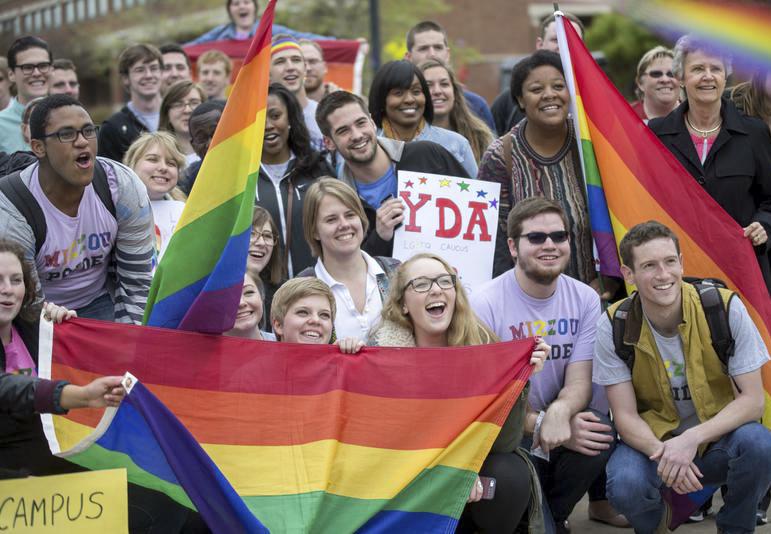When the LGBTQ Resource Center opened in October 1995, it looked nothing like it does today.
“It was only open a few hours at a time, and you had to kind of basically make an appointment to get there,” former LGBTQ Resource Center coordinator Nikole Potulsky said. “Bottom line is, in 1995, it was hard to find community and having a center let you go somewhere where you could create community.”
Potulsky, previous coordinator Struby Struble, current coordinator Sean Olmstead and students attended the LGBTQ Resource Center’s 20th anniversary celebration Oct. 9 in recognition of the center’s efforts to support students of different identities on MU’s campus.
Olmstead took over this summer from Struble after she enrolled at Mills College in Oakland, California to pursue an MFA in creative writing. He said he hopes that his work in the center, a resource he never had in college, will continue to give support to students.
“It’s a great experience to help provide a place where (students) can be themselves authentically and not have to apologize for who they are or the space they take up,” Olmstead said. “I kind of joke with students about that, like don’t apologize for the space that you take up, but I really mean it, because we’re oftentimes told that we shouldn’t be here, we don’t exist, that we’re problematic.”
Potulsky attended MU as an undergraduate student from 1994 to 1999 and became coordinator for the center in 2001. Before the center opened in 1995, people like her struggled to find people with whom they could identify, she said.
“In 1995, I was a sophomore,” Potulsky said. “I had just come out. I had my first girlfriend. Back then there was barely the Internet, so if you wanted to find other LGBTQ people, you really had to do it word-of-mouth. You had to out yourself, which was a risk.”
Olmstead said the center has grown throughout the last 20 years to meet the changing needs of students.
“In the beginning, it was just trying to convince the administration that heterosexism and homophobia exist on this campus,” Olmstead said. “Now, it’s a lot more education. We’re trying to focus on creating more allyship on campus while still creating safe spaces for LGBTQ students.”
Potulsky agreed that the center has changed immensely since its opening.
“In those first couple of years, it was a gathering spot,” Potulsky said. “Now, it’s a hub of activity. There are people that lobby at the state level from this place. There’s a radio program that airs out of the center now. It’s unbelievable, unbelievable growth over the last 20 years.”
In 1995, The Maneater published an article illustrating the importance of the center, which at the time was called the “Lesbian, Gay and Bisexual Resource Center.”
“I think it is really hard for gays and lesbians,” then-senior Christian Burlingame said in the article. “They grow up in an environment that constantly sends them messages that they are wrong, and that what they’re feeling is wrong or bad.”
Current freshman Sterling Waldman, who uses they/their pronouns, spoke on their perspective as a transgender student at MU.
“I think overall, the internalized messages are still very similar,” Waldman said. “I think that’s changing and shifting a little bit. It’s gone from like no positive media representation to barely positive media representation, but there is some now, which is definitely going to at least begin shifting cultural norms.”
Waldman said they would not have chosen to come to MU if the LGBTQ Resource Center didn’t exist.
“It’s so well-established,” Waldman said. “It’s one of the best in the Midwest. It’s really a defining characteristic of my experience here.”
Moving forward, several people at the event expressed they would like to see the center work on issues that address the intersectionality of different minorities on campus.
“How do we talk about trans students who are also in the Jewish faith, and how do we talk about queer Muslims and what that feels like, and how do we just incorporate the disability movement when we’re talking about inclusivity on campus?” Struble said. “It’s not just inclusivity of our sexuality, it’s inclusivity of all of our identities. I think it’s just important to keep moving with the times.”
As for Olmstead, he said he continues to learn more every day about the wants and needs of the students who come to the center.
“I hope that (the social justice centers) continue to be places where students can learn to discover themselves, educate each other and create programs that support an inclusive campus,” Olmstead said.
The LGBTQ Resource Center is hosting Coming Out Week from Oct. 11 to Oct. 17, which includes a workshop and keynote speech by Potulsky. The annual Pride Photo will be taken at 5:00 p.m. on Oct. 14 on the Francis Quadrangle.








